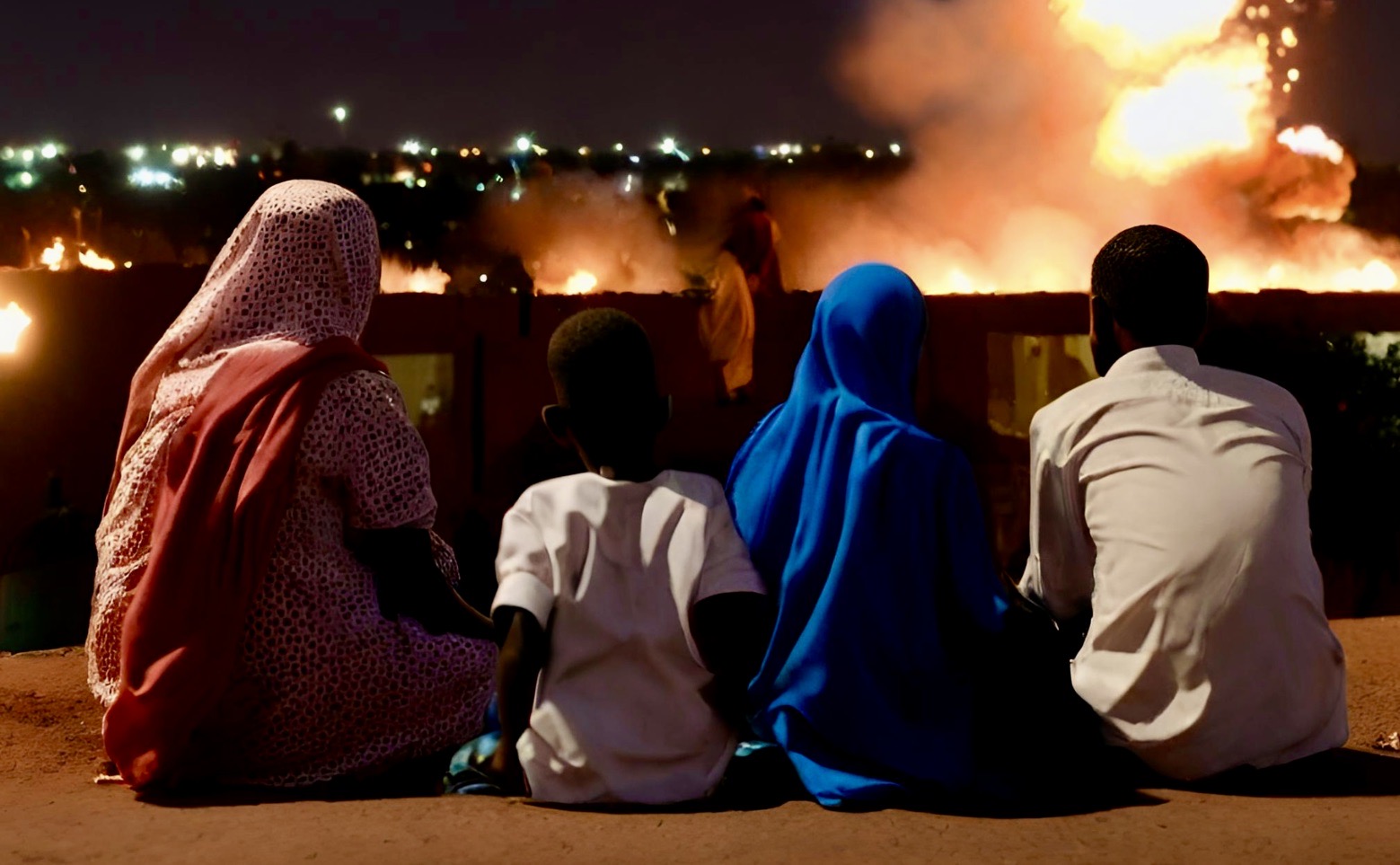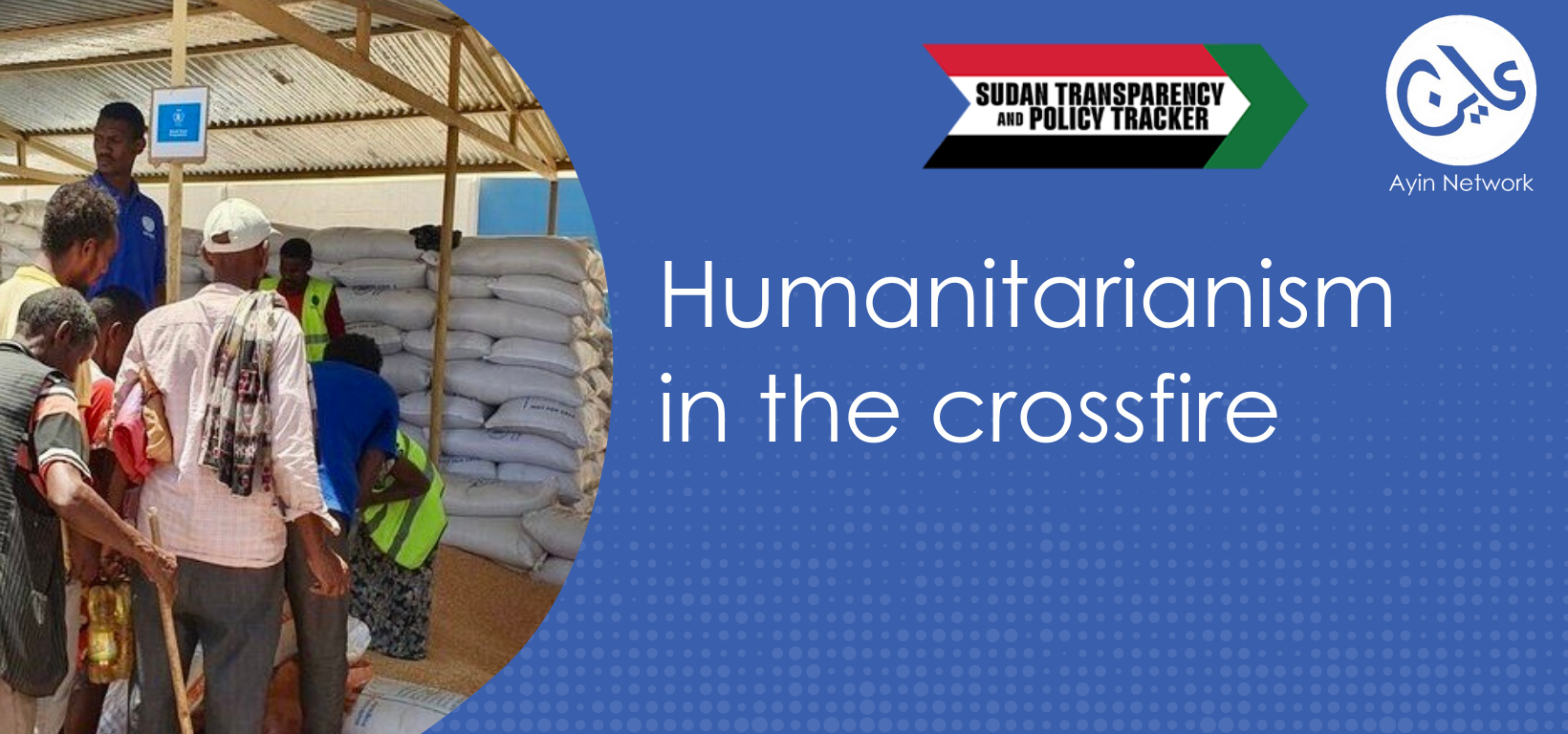Sudan Conflict Monitor #11
12 March 2024
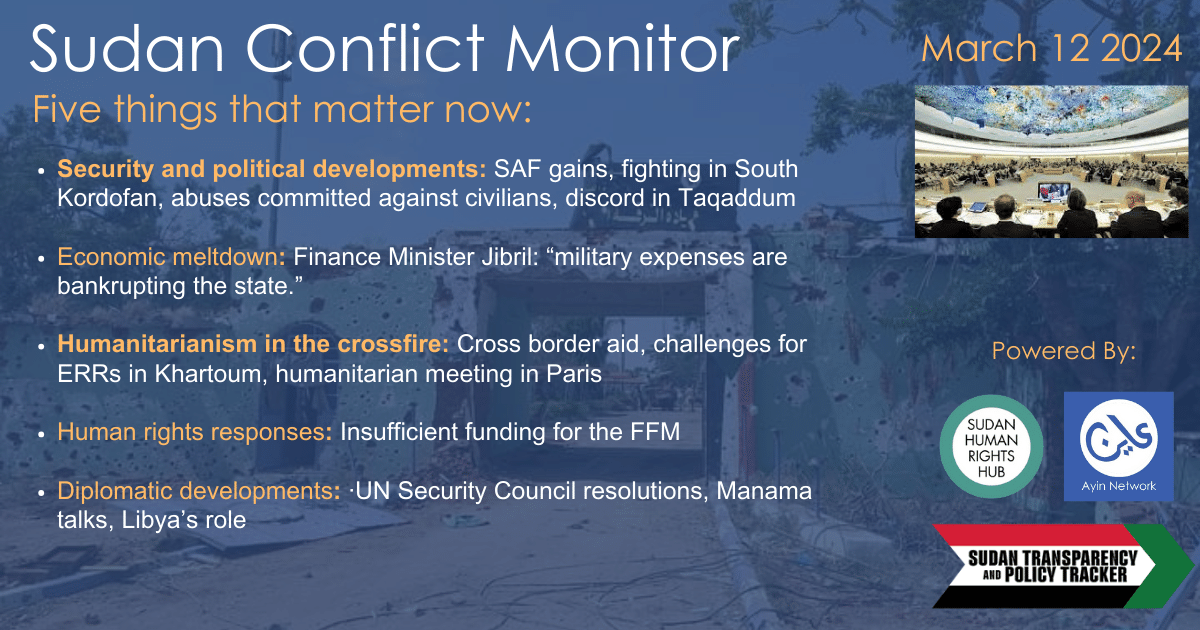 The Sudan Conflict Monitor is a rapid response to the expanding war in Sudan written through a peace-building, human rights, and justice lens. Here we have tried to capture the five most important stories in Sudan. Please share it widely.
The Sudan Conflict Monitor is a rapid response to the expanding war in Sudan written through a peace-building, human rights, and justice lens. Here we have tried to capture the five most important stories in Sudan. Please share it widely.
Powered by Ayin Media and the Sudan Transparency and Policy Tracker
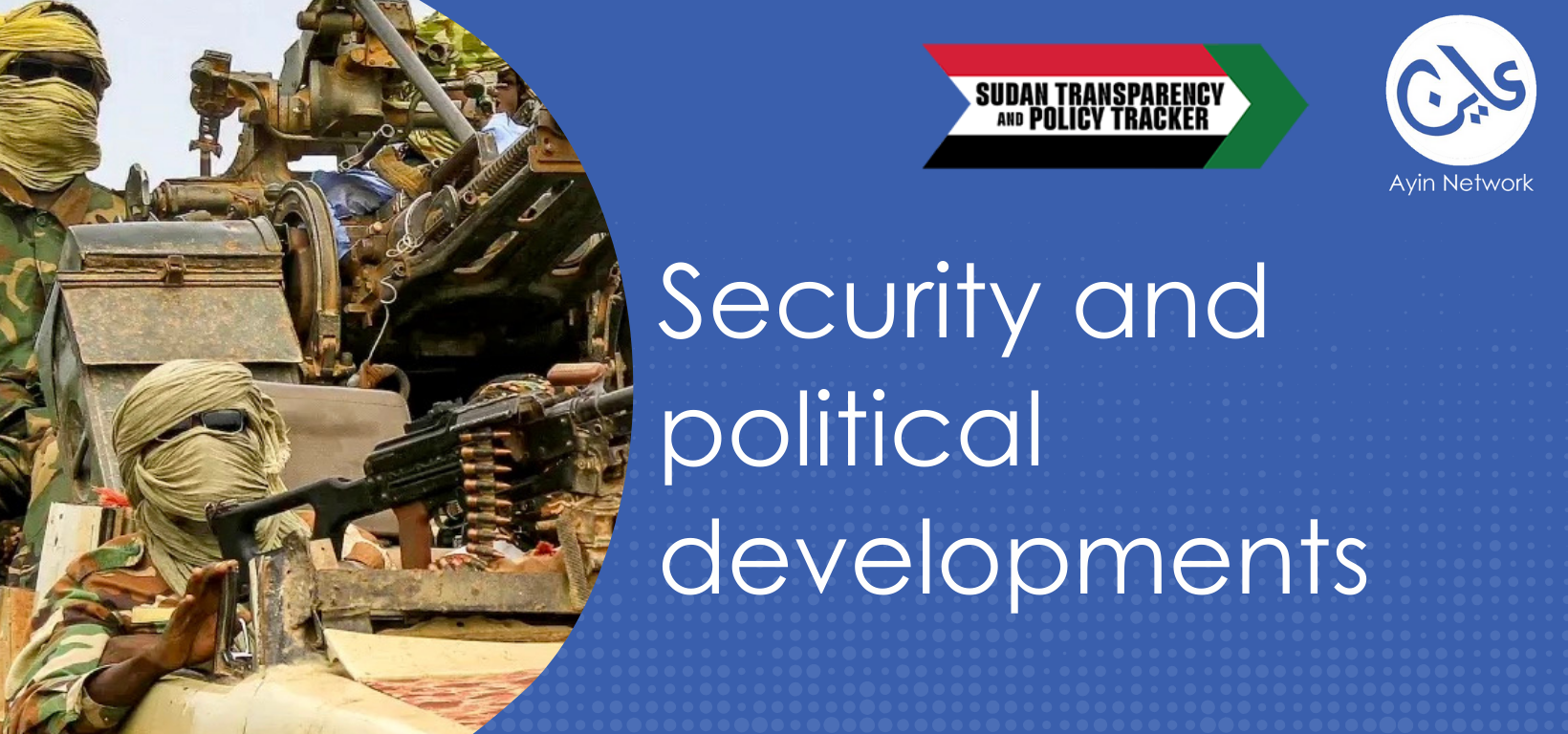
1. Security and political developments
SAF makes significant gains
For the first time since the start of the war, the SAF moved into an offensive posture and regained territory in Omdurman. The break of the siege of the Engineers Corps and residential quarters of Old Omdurman offered a moral boost to SAF soldiers and supporters and was welcomed by large cheering crowds trapped by the fighting for the ten months of the war.
Activists interviewed by Ayin speculated that recent SAF advances were partly due to the overextension of RSF forces, spread thin after their expansion into Gezira state. Others noted a change in the SAF approach, taking a longer-term perspective, rather than demanding immediate gains. They also speculated that recent statements by the US Congress accusing the RSF of genocide have reduced their space for a military manoeuvre.
The offensive to break the siege of the Engineers’ Corp in Omdurman reportedly had another objective: extract former regime officials who were trapped in the Military Hospital during the siege. The deteriorating health condition of one of them added urgency to the break of the siege. Among the former officials reportedly freed were two wanted by the ICC: deposed President Omar Al Bashir and his Minister of Defense during the Darfur Genocide of 2003-5, Abdelrahim Mohamed Hussein. Other regime officials were also extracted, namely former vice-president and Prime Minister Gen. Bakry Hassan Salih and Ret. Gen. Yousif Abdel Fattah, was a member of the military council and ruling party during the early years of the Bashir regime. Bashir has not publicly appeared since his alleged extraction, contrary to Abd el Fattah, who appeared in a video thanking the Military Hospital’s personnel.
In a rapid succession of speeches to soldiers in different garrison towns that followed SAF’s change of strategy, the SAF’s three top commanders spelt out the army’s conditions for agreeing to a ceasefire and a negotiated end of the war. Lt.-Gen Kabashi speaking on February 15 before SAF’s 18th Infantry Division in Kosti rolled out three conditions:
- There will be no political negotiations before the settlement of the military dossier.
- RSF must leave civilian residences and public and private buildings it has occupied in Khartoum and Gezira states and relocate its soldiers to cantonment camps.
- RSF must accept that its soldiers will not be integrated into the SAF and must be processed through security arrangements determined by the SAF.
Otherwise, war will continue until the SAF imposes peace through the total defeat of the RSF.
Burhan went further in a speech during a garrison tour in Gedaref state on February 20. He reiterated that there would be no political process before the end of the war and specified that this would mean either the voluntary withdrawal of the RSF from all territories under its control, including Darfur and Gezira, or the SAF freeing them through military action. The speech addressed fighters from the SLM-Mini MInawi, SLM-Mustafa Tambour, and other armed movements undergoing training in Gedaref’s 2nd Infantry Division.
Indeed, SAF sent fighters from the armed movements that pledged to support the army to its different divisional headquarters for retraining and redeployment in its new offensive campaigns to recapture territories under RSF control. Speaking during the graduation ceremony for some 1,500 Justice and Equality Movement (JEM) recruits in Kassala, on March 9, Lt.-Gen. Yasir Al-Atta, SAF’s second-in-command, publicly rejected the UN Security Council resolution on March 8 calling for a truce during the Holy month of Ramadan. The SAF has reportedly called RSF commitments into question, saying that it “is devoid of any religious, moral or national scruples and cannot therefore respect the sanctity of the holy month.” Al-Atta further detailed SAF’s conditions for agreeing to negotiations and a truce: that the RSF should first withdraw from all cities and states it currently occupies, surrender its weapons, and canton its fighters in six camps, three in Khartoum and three in Darfur. Standing next to the general was Jibril Ibrahim, the finance minister, dressed in full combat fatigues as the JEM commander.
Faced with a somewhat tepid response to the general mobilization and “popular resistance” campaigns among the population (see earlier reporting by Sudan Conflict Monitor), SAF’s strategy to defeat the RSF appears to be increasingly reliant on the ideologically driven “Jihadist brigades”. These brigades are predominantly mobilized by former Bashir regime Islamist hardliners or recruited from the Darfur movements, especially the Zaghawa-dominated SLM-Minawi and JEM. These fighters, alongside those from the SPLM-N Agar faction, will join the build-up of SAF’s forces for retaking Gezira state and potentially secure the SAF’s hold on North Kordofan, including the state’s capital, El-Obeid. The alliance between the SAF and these movements is cemented by their shared rejection of a post-war pro-democracy political dispensation.
In early March, the RSF ambushed and inflicted heavy casualties on SPLM-N Agar soldiers who joined SAF’s 4th Infantry Division in Blue Nile as they attempted to advance from Sennar to Wad Medani.
In the meantime, the RSF has slowed down major offensives or territorial conquests since its takeover of Wad Medani and Gezira state in December. It nonetheless launched another offensive on 9 March to take the oil-rich town of Babanousa, West Kordofan State. Indeed, recent reporting has suggested that the RSF is facing both popular resistance in Gezira and SAF offensives to retake territory out of Sennar and El Managel.
Fighting in South Kordofan and courting Al Hilu
There has been recent fighting in South Kordofan, with fighting ongoing between the SPLM-N Al Hilu and Rapid Support Forces. SPLM-N forces were reportedly repelled in Um Safifa, but successfully took the area of Karkaraya. The actions may increase speculation about an SPLM-N alliance with the army, which was claimed by the army, but denied by SPLM-N.
Earlier in the month, it was reported that the SAF had reinforced Kadugli, with a reported intention to reopen the Kadguli-Dilling road, which has been closed since the SPLM-N took the area.
Further, the civilian Taqaddum alliance is courting SPLM-N, with Taqaddum leader former Prime Minister Hamdok reportedly preparing to meet the SPLM-N leader and seek to resolve differences. This shows the potential role of Al Hilu in changing the balance of power among Sudan’s other competing factions.
Abuses committed against civilians
Civilians continue to be killed by belligerents and men in uniforms of all colours and patterns affiliated with other armed actors. Civilians are felled in the crossfire of heavy artillery shelling in Khartoum and its twin cities of Omdurman and Khartoum North. In Gezira state, marauding RSF soldiers, mostly moving in motorcycle band formations, continued to fan throughout the villages of the region, robbing villagers of their vehicles and valuables and killing those who resisted. Now in its fourth week, the Internet blackout has made it difficult to monitor the grave violations that local populations suffered. Resistance committees were the first to raise the alarm, drawing broad condemnations of the RSF from the media, rights groups, and spokespersons of the Taqaddum coalition.
The RSF accused fighters of the SLM-Minawi faction headed by Darfur governor Minni Minawi of having killed a dozen people during a highway robbery on the Daein-Nyala road. Minawi denied responsibility on behalf of his movement and said they would investigate and hold perpetrators accountable regardless of their affiliation.
SAF fighter jets and armed drones routinely target buildings in residential areas where RSF fighters hide or deploy snipers, occasioning vast collateral civilian casualties and vast residential destruction. SAF also launched indiscriminate bombings on civilians, as has happened during aerial raids that dropped dumb barrel bombs in residential areas in towns controlled by the RSF even when there was no RSF presence in the targeted areas. The latest incident occurred in Naeima in White Nile state, Hamrat El-Sheikh in North Kordofan, and Daein in East Darfur.
Mass recruitment drives of civilians in SAF-controlled areas are also causing problems for the wider public. The new army recruits, civilian-turned-soldiers known as “the mobilized” or, in Arabic, the “mustanfareen” are misusing their new positions to commit arbitrary arrests, raid homes and set up roadblocks to collect bribes. Adam Suleiman, a civilian from the eastern city of Gedaref who voluntarily helps the war-affected, says the “mustanfareen” are acting with impunity under the silent watch of the army. “They abuse merchants and street vendors, often blackmailing them when the curfew begins,” he told Ayin. Any transgressions by the “mustanfareen” are purposefully overlooked by the army. “The army does not want to lose them, so they don’t interfere – they [the mustanfareen] also do not earn salaries, so they may let them earn from other means.”
Testimonies are also emerging of the RSF’s harsh and inhumane treatment of hundreds of civilians arbitrarily detained by its soldiers in Gezira state, particularly in the villages of Abu Gouta and Taiba. As a recent social media post laid out, “Many schools and homes have been turned into multi-functional holding places, as this militia is trying to play the roles of the police, intelligence, prosecution, and court in one office at the same time. Thousands of detainees without investigation and on fabricated charges, all categories, the sick, the wounded, the elderly, and children.” The Internet blackout prevents families from identifying where their loved ones are detained.
Taqaddum: Rumblings of Discord
On the political front, it seems that internal leadership tensions are emerging within the Umma Party that are bound in their current trajectory to affect the unity of the Coordination of Civil Democratic Forces (Taqaddum) if not rapidly resolved. A meeting of the Umma Party leadership sent an open letter to Taqaddum on March 9, acknowledging the positive contributions of the coalition since its launch in late October 2023 in Addis Ababa. The letter also criticized aspects of the coalition’s performance, asking it to address these shortcomings within two weeks – implying that failure to do so would cause the Umma Party to reconsider its membership.
Among the concerns cited was the widespread impression that Taqaddum’s leadership was effectively in the hands of a few Forces of Freedom and Change figures and that leadership selection had been insufficiently consultative or transparent. The letter ominously hinted that some in the narrow leadership gave the impression of being less critical of the RSF violations than they should be. The letter urged Taqaddum to maintain an equal distance between the RSF and the SAF to assume the mediation role for ending the war it set for itself.
As the Umma Party is a founding member of Taqaddum and is represented in its leadership by the party’s chairman, Burma Nassir, and its secretary general, Al-Wathig Al-Birair, the letter reveals internal challenges to their leadership. It remains to be seen if former PM Hamdok and other members of the coalition’s leadership council will be able to convincingly address the concerns of the dissenting Umma Party leaders and preserve the unity of the coalition.
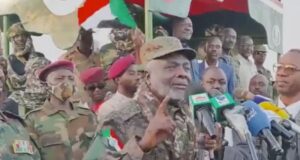 JEM’s Tribulations
JEM’s Tribulations
Jibril Ibrahim, seen here in full combat fatigues, the finance minister in the SAF-controlled government in Port Sudan, doubles as commander in chief of the Justice and Equality Movement (JEM). Ideologically aligned with the Islamists, he has earned and maintained his position in the executive as a dividend for JEM’s signing of the Juba Peace Agreement in 2020 and joining the political forces and armed movements that paved the way for the October 2021 coup d’état. JEM’s decision to end its neutrality in the ongoing war and align its forces with the SAF led to a split in the movement with several prominent political leaders and military commanders deciding to remain neutral and to join the Taqaddum coalition in seeking a negotiated end to the war.
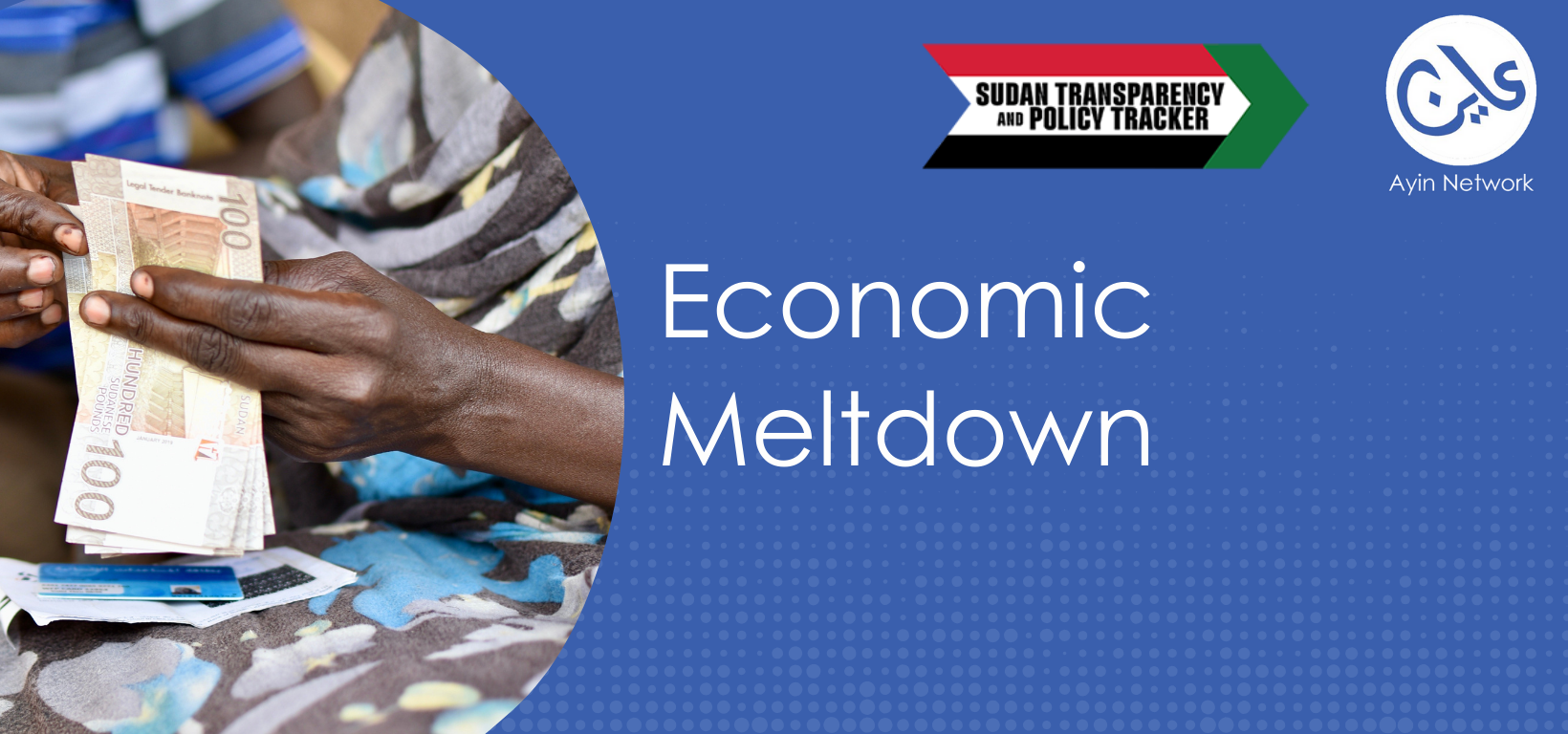
2. Economic meltdown – Finance Minister Jibril Ibrahim: “Military expenditure is bankrupting the state”
On 26 February, Finance Minister Gibril Ibrahim and JEM’s commander gave a blunt statement on the dire state of the economy during the war in his press conference. He noted that the exceptional war circumstances had far-reaching negative consequences for the economy, including a fall in the state’s revenues by more than 80 percent. This forced his government to direct the remaining 20% of public revenues to a handful of key priorities:
- The military effort
- Humanitarian relief
- The health sector
- Transfers to the federal states
- Salaries of public sector workers, and
- A small percentage goes to providing the local component in donor-funded development projects.
In a country where, by UNICEF’s estimates, 19 million school-aged children are out of school, the Port Sudan government failed to place education on the priority list of wartime expenditures. Support for the traditional producers in the agricultural and livestock sectors, which are the mainstay of a majority of the Sudanese population and make significant contributions to the country’s GDP, is also receiving little to no resources.
Adding to the burden of military expenditure, Gibril explained that the volunteer jihadist fighters of the Islamist Movement were recently placed on the government’s payroll. Stating the obvious, Gibril admitted that “military expenditure is bankrupting the state.” So much so, he acknowledged that the Port Sudan government, which is accountable to the military, was considering selling state assets “to neighbouring countries” to finance the deficit. A fire sale such as the one envisaged by the finance minister will undermine whatever remains of the resilience of the Sudanese economy, precipitating its total collapse.
3. Humanitarianism in the crossfire
Cross border aid: potential and questions.
Amidst calls for global interventions to tackle Sudan’s hunger crisis, in late February, authorities in Port Sudan imposed a ban on cross-border humanitarian relief convoys from Chad and South Sudan entering the Darfur region. The government claimed that Chad and the UAE were using humanitarian convoys to smuggle weapons to the Rapid Support Forces. Both countries denied the accusation. Faced with a swift backlash from both international and local aid groups, the government retracted the ban days later.
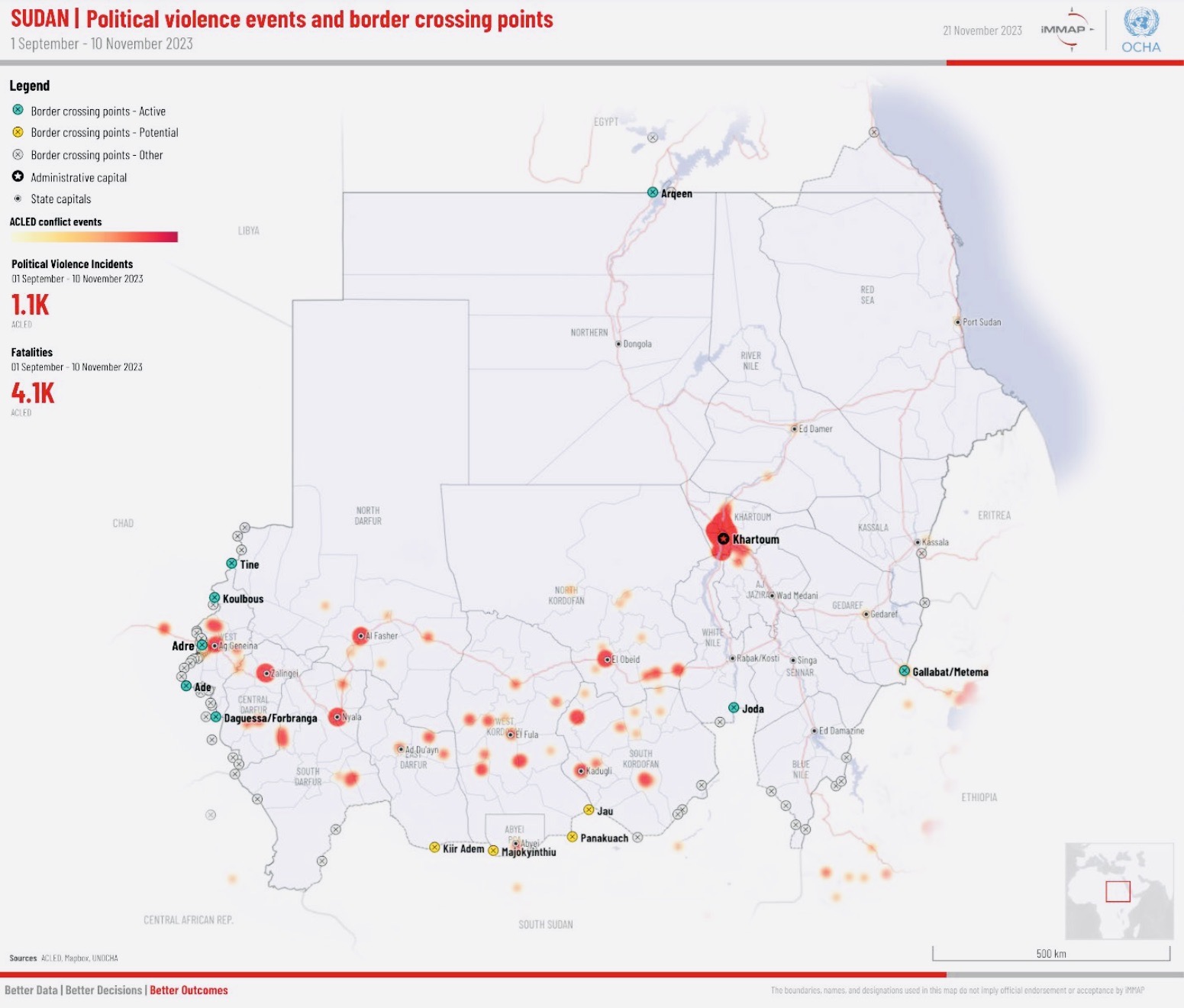 By re-authorizing humanitarian assistance to enter Darfur from Chad through the border crossing of Tina in North Darfur and from South Sudan via Renk in White Nile state, the Port Sudan government appeared to have made a significant concession. However, it is important to remember that these steps address a problem that the government itself created. This is a typical move in the playbook of “securocrats” who have been running the country’s humanitarian affairs for three decades – and underscores that their control of the sector continued during the transitional period.
By re-authorizing humanitarian assistance to enter Darfur from Chad through the border crossing of Tina in North Darfur and from South Sudan via Renk in White Nile state, the Port Sudan government appeared to have made a significant concession. However, it is important to remember that these steps address a problem that the government itself created. This is a typical move in the playbook of “securocrats” who have been running the country’s humanitarian affairs for three decades – and underscores that their control of the sector continued during the transitional period.
Before the February ban, humanitarian assistance supplies entered Darfur from Chad and South Sudan via multiple border crossings, including via Tina in North Darfur, Kulbus and Adré to West Darfur, Daguessa to Central Darfur, and Um Dukhun. The current authorization is limited to the route from Tina, which has less humanitarian infrastructure than the others. Moving aid operations currently going through the other access points to Tina would require considerable resources. In addition, it will mean moving aid into an area controlled by the Darfur movements aligned with the government, and then to the government-controlled city, El Fasher. The decree reinforces the government’s policy of denying aid to areas that the RSF controls as it doesn’t explicitly authorize crossline aid. This raises concerns about the ability to move aid across the front lines to suffering civilians in areas under RSF control in the other four states of Darfur. Past deliveries reached El Geneina, and Zalinegi in Central Darfur in hours. Even if logistically possible and allowed by the government, moving supplies from El Fasher would take longer and be more costly.
The decision was immediately criticized by Dr Al-Hadi Idriss, leader of the SLM-Transitional Council, who demanded that decisions about humanitarian aid involve all stakeholders, including the RSF and the armed movements, to ensure that the assistance reaches all affected areas. An advisor to the RSF welcomed the decision on Radio Dabanga but noted that the RSF was not consulted about any of the border crossing routes. On X, MSF referred to the plan as a “partial solution at best for North Darfur but leaves vast areas in Darfur, Kordofan, Khartoum and Gezira states still inaccessible.”
Challenges for ERRs in Khartoum
Radio Dabanga reports that the latest fighting in Khartoum is making it difficult for ERRs to function. It cited Wael Abdelrahim, member of the El Haj Yousef Resistance Committees and coordinator of the Khartoum State Services Office, reporting that ERR community kitchens in Khartoum State had been serving more than 200,000 people, but had been forced to shut them down as a result of “the increased fighting, internet shutdown, difficulties in finding and transporting food and lack of funding.”
An ERR member interviewed by SCM reported that the ERRs had not closed down, but reported that lack of internet was creating difficulties in getting funding to the programs, exacerbated by delays by funders in releasing the money. Ayin has reported that 90% of all community kitchens have been shut down, facing difficulty in transferring money and finding it difficult to move supplies into affected areas. In addition, ERR members are facing serious human rights violations, including harassment from both parties, beatings, and confiscation of food shipments.
The New Humanitarian reported that similar difficulties are reported by civilians who had been reliant on family abroad to survive, quoting one who said that the lack of support has left her reliant on community kitchens. As a result, hunger is increasing in the city, “most families cannot afford food for a single day.”
Humanitarian meeting in Paris
French diplomacy is organizing a humanitarian conference for Sudan on April 15, marking the first anniversary of the conflict. The event is modelled on the conference the French government had organized for Gaza and co-organized by Germany and the European Commission of Humanitarian Aid (ECHO). A donor pledging meeting at one level, the conference is said to have on its agenda the discussion of obstacles to humanitarian aid and cross-border delivery of assistance and creating a space for civilian discussion of the need for peace and the post-conflict political dispensation. The meeting is expected to build on the outcomes of the humanitarian conference held in Cairo on November 18-20, 2023. Organizers seek broad representation of civic groups opposed to the war, including the Coordination of Civil Democratic Forces (Taqaddum) led by former Prime Minister Abdalla Hamdok.
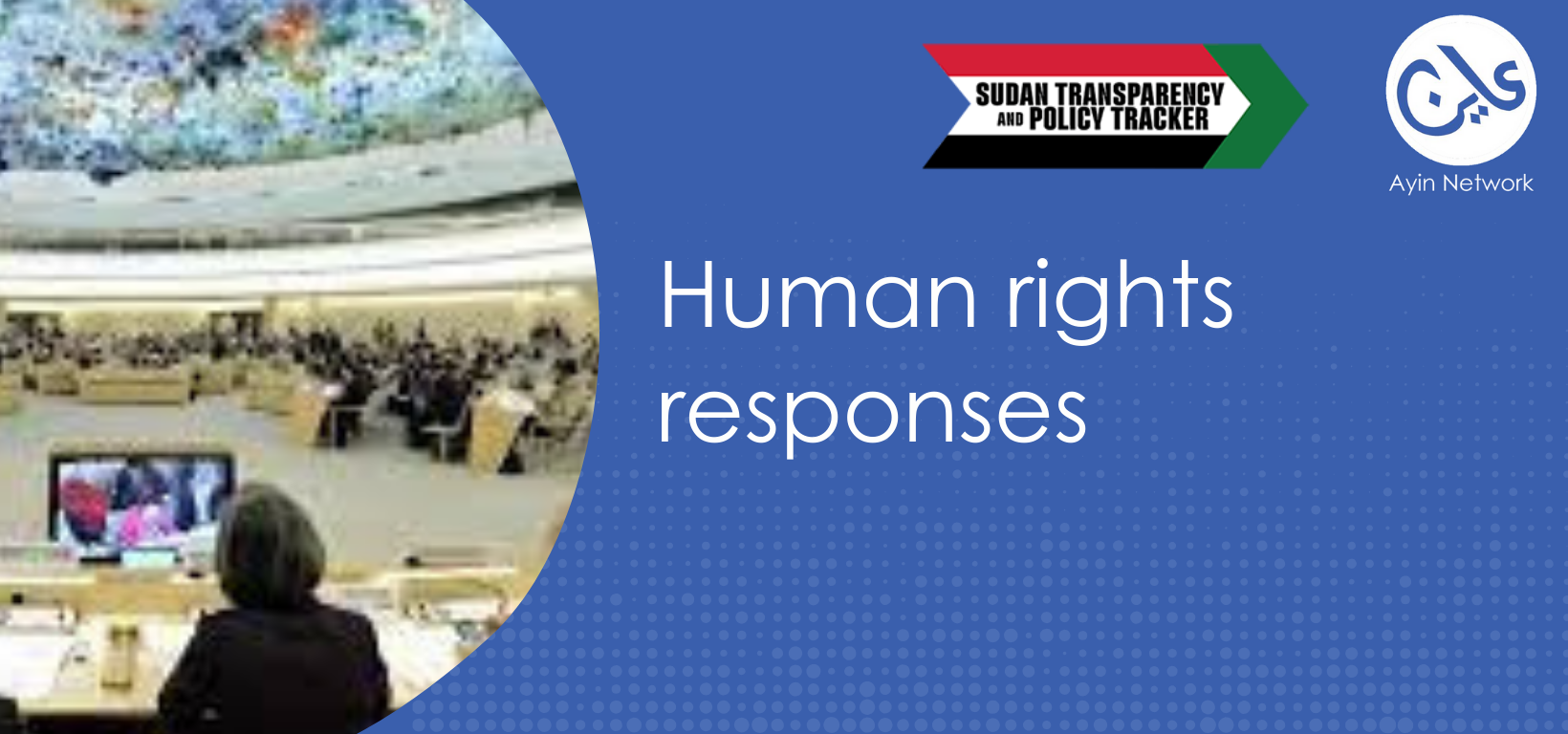
4. Human rights responses
Independent Expert reports; Fact-Finding Mission struggles with insufficient funding
On March 1, the Independent Expert on Sudan reported in Geneva to the Human Rights Council on the human rights situation in Sudan. The Independent Expert raised many of the same issues that have been raised in this monitor, including the targeting of civilians by both sides, attacks on health facilities, looting of humanitarian supplies, obstruction of humanitarian aid, mass killings in Darfur, and other abuses. The Independent Expert announced a planned visit to Sudan, which reportedly has received support from the government of Sudan. Although the government of Sudan has reneged on commitments like that in the past, the Expert and his team remain hopeful.
After the Independent Expert spoke, many states responded. Many were supportive, calling for a ceasefire, free flow of humanitarian aid, and respect for human rights. Several states called on the Independent Experts to make recommendations as to how to make this a reality. Although it wasn’t formally on the agenda, the Fact-Finding Mission on Sudan, which was authorized in October 2023 with a mandate to investigate violations of international humanitarian law violations and preserve evidence for future legal proceedings, was mentioned.
Sadly, the FFM has not gotten adequate support. Although the FFM is working hard to deliver on its mandate, it has not been able to fill any of its requested staff positions. This is due primarily to the liquidity crisis in the UN, caused by the failure of some member states, notably the United States, to pay their dues on time. According to the UN Secretary-General, the UN faced arrears of $859 million at the end of 2023. This problem is affecting all HRC mechanisms, but especially the FFM because it was seeking to recruit just as the liquidity crisis was worsening. There is an urgent need to remedy this situation. As Sarah Jackson, Amnesty International’s Deputy Regional Director for East and Southern Africa put it in a recent op-ed: “With increasing pushback on human rights mechanisms, the International Fact-Finding Mission for Sudan’s creation was nothing short of a triumph, but the failure to staff it, undermined it from the beginning and must be remedied before it is too late.”
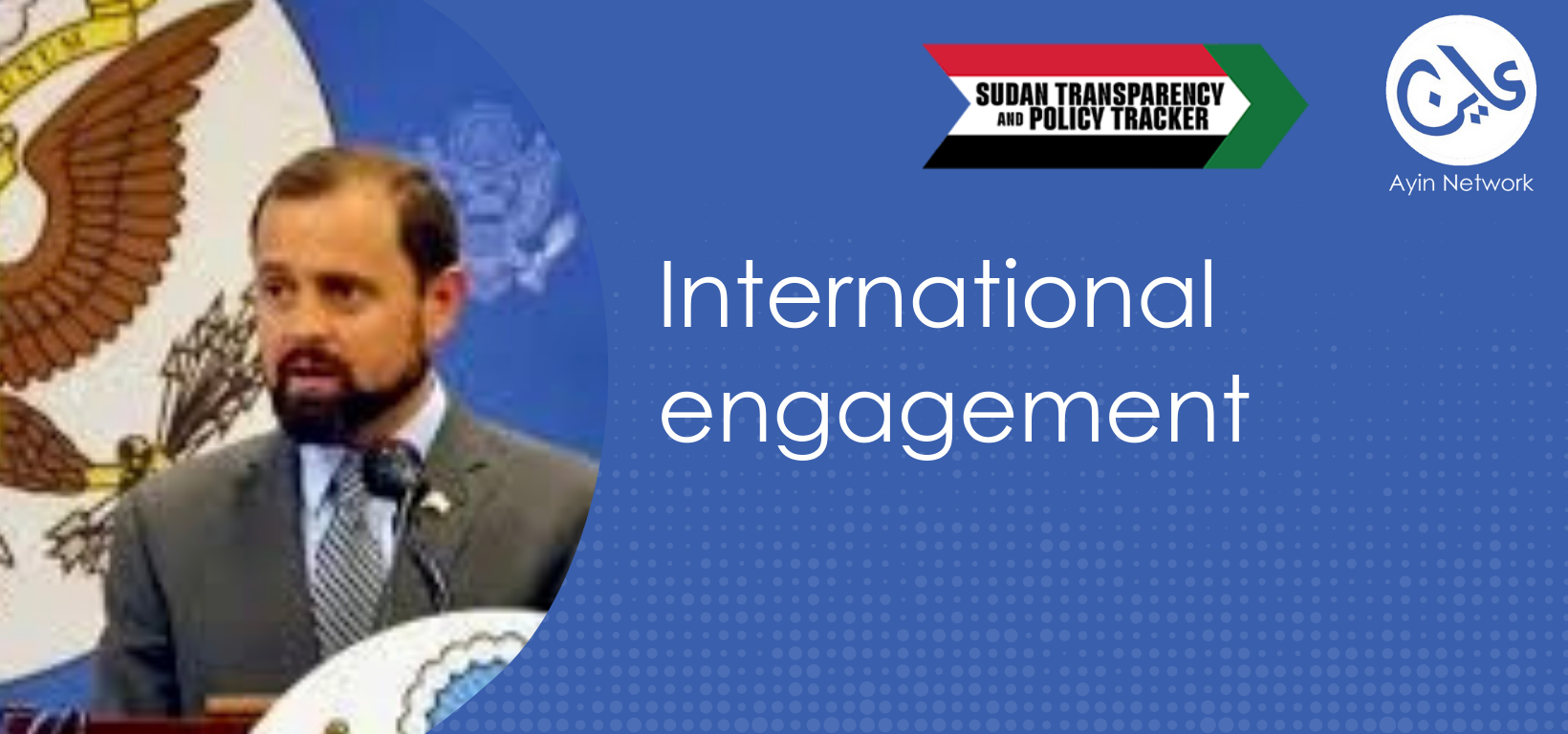
5. International engagement
The UN Security Council issues two resolutions on Sudan
On Friday, March 8, the UN Security Council issued two resolutions on Sudan, one calling for a ceasefire and the other extending the mandate of the Panel of Experts, which advises the council on issues related to the UN sanctions regime for an additional year.
The resolution on the ceasefire passed by a vote of 14 for and one abstention (Russia). While it is positive to see this level of consensus from states, there are already concerns about implementation, as SAF has reportedly rejected the proposal, as noted above. The RSF welcomed the resolution and expressed hopes that the temporary truce “will significantly lessen the suffering of the Sudanese people by ensuring the smooth delivery of humanitarian aid and enhancing the mobility of civilians.”
Manama talks
Bahrain’s capital, Manama, hosted three undeclared meetings in January between two senior deputies of the warring parties: SAF’s third in command, Gen. Shamseldin Kabbashi, and RSF’s second in command, Gen. Abdelrahim Dagalo. Officials from Egypt and the UAE, the respective backers of the SAF and the RSF, took part in the meeting, as did the facilitators of the Jeddah Platform, the US, and Saudi Arabia. The parties initiated a declaration of principles, “Principles and Foundations For A Lasting Solution for the Sudanese Crisis,” later leaked to the press (a full copy is available in Arabic here.) It provided for maintaining the unity of Sudan and reforming and modernizing the army, establishing democratic and civilian rule, and equal citizenship, and resolving the chronic post-independence wars. The Declaration also stipulated the dismantling of remnants of the Bashir regime that outlasted its fall and the surrender of the three ICC indictees to the Court, namely Omer Al-Bashir and his Ministers of Defense and State for the Interior, Gen. Abdelrahim M. Hussein and Ahmed Haroun, who presided over the regime’s genocidal campaign in Darfur in 2003-05.
Kabashi’s meeting with Abdelrahim Dagalo and the agreement they signed came under fierce criticism on Islamist social media. Sources told STPT that Islamist officers within the SAF threatened to topple Burhan and Kabashi’s command. They adopted hardline positions pushing Burhan and Kabbashi to repudiate the agreement. In their subsequent addresses to soldiers and domestic audiences, they have sought to reassure this constituency there wouldn’t be a negotiated ceasefire with the RSF until it gives up its territorial gains and agrees to the containment of its soldiers.
Kabashi’s reversal in particular offered additional evidence that Islamist hardliners within the SAF and amongst the remnants of the Bashir regime are in control, managing the campaign to sustain the SAF’s military offensive, including through the general mobilization and Popular Resistance recruitment drives.
Libyan peace initiative, Egyptian ire
The Libyan offer to mediate between the two generals to restore peace in Sudan has seriously backfired, with Egypt reportedly taking issue with the conflicting signals sent by Burhan following his one-day visit to Tripoli to meet with his counterpart Mohamed Al-Manfi and Prime Minister El-Debeiba on February 26.
On the margins of the brief official visit, Burhan met with the controversial Sheikh Al-Sadeq Al-Gharyani, recognized by the Muslim Brotherhood movement as the Grand Mufti of Libya, and briefed him about the situation in Sudan. Banned from re-entering the UK in 2014 for his role in inciting the takeover of Benghazi by a militant Islamist militia, Al-Gharyani has issued fatwas justifying suicide bombings and other controversial issues over the years.
Several influential analysts in Sudan and Egypt interpreted Burhan’s meeting with Al-Gharyani as a message to his Islamist supporters.
According to Dr. Amani Al-Tawil, the influential Egyptian analyst, Egypt reacted with concern to this nod to the Islamists, prompting Burhan’s visit to Cairo two days after he visited Tripoli. The Egyptian establishment is seriously concerned about the influence of Islamist leaders of the former regime on the SAF decisions and the reversal of commitments. Egypt is also alarmed, Dr. Al-Tawil warned in several of her recent media appearances about the large-scale arming of civilians leading to the breakdown of law and order in Sudan, with destabilizing effects on neighbouring Egypt.
Egypt has sought to further engage, unphased by the lukewarm reception of its earlier “Neighboring Countries’ Initiative”, inviting former Prime Minister and the Chair of the Taqaddum initiative Abdalla Hamdok to visit. On the heels of Burhan’s visit, Hamdok’s visit, accompanied by official decorum, showed that Egypt was open to listening to civilian proposals for ending the war and the post-war political dispensation.
The US appoints a new Special Envoy for Sudan
On February 26, US Secretary of State Antony Blinken appointed a new special envoy for Sudan, Tom Perriello. The move — one that members of Congress from both parties, along with activists and analysts, advocated for many months — should signal that the US is serious about doing everything it can to end Sudan’s disastrous and devastating war. As others have pointed out, Perriello’s appointment might be short-lived but there is still time to make some headway.
Advocacy groups have already started to brief the Envoy, who will also engage with Sudanese in exile in Kampala, Addis Ababa, Nairobi, and Cairo. The immediate priority, ever more urgent with famine looming, is getting a cessation of hostilities in place and humanitarian access arrangements agreed and monitored. A second priority is to press allies to end violations of the UN arms embargo on Darfur. The UAE’s flouting of the embargo, documented by the UN Panel of Experts for Sudan, shouldn’t be ignored.
Another goal would be to ensure that the US clears its back payment of dues to the United Nations and takes any other steps needed to unblock funding for the UN’s Fact-Finding Mission for Sudan. This mechanism and other UN documentation efforts are critical for transitional justice, which should be a lynchpin of any eventual peace agreement.
Crucially, the Envoy will need to work across regional bureaus in the US government and engage key actors in the Middle East, Red Sea, and Sahel regions in Sudan. This needs political savvy and high-level engagement — something that appears to have been missing in recent years.
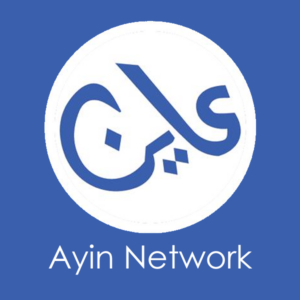
Follow Ayin: YouTube Facebook Twitter
Ayin Coverage (English)
- Sudan’s healthcare, the first casualty of war March 2024
- Hope or Hopeless: The UN’s resolution for the war’s respite in Ramadan March 2024
- Sudan’s war curbs South Sudan’s oil exports, triggering inflation March 2024
- Schools in limbo: How children cope in war-torn Sudan March 2024

Sign up for the Sudan Transparency and Policy Tracker newsletter here


